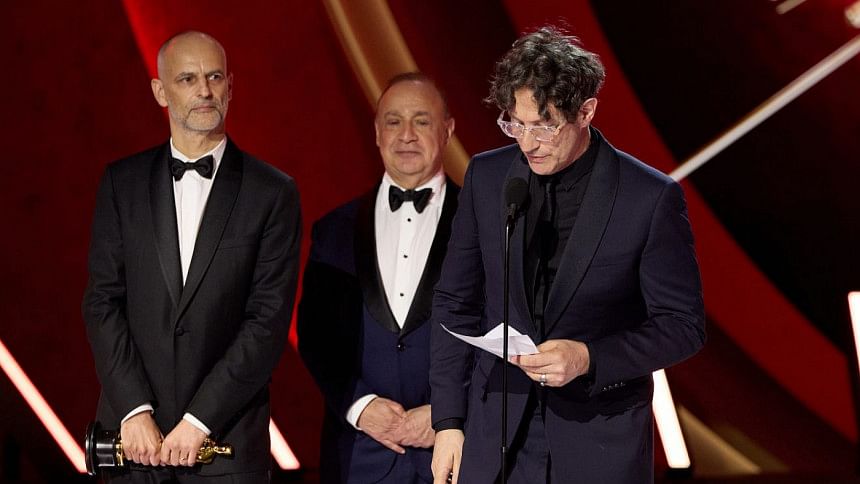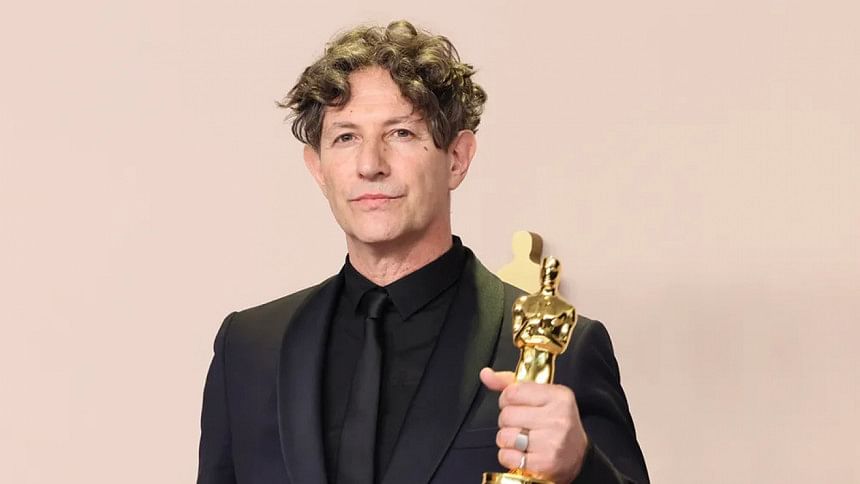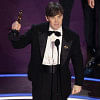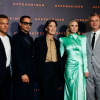Banality of evil in Jonathan Glazer's brutal masterpiece ‘The Zone of Interest’

Jonathan Glazer's film "The Zone of Interest" has carved a haunting niche in cinematic history, digging deep into the abyss of Nazi Germany's atrocities with chilling resonance. Unveiling the banality of evil and the human capacity for self-justification, Glazer orchestrates a symphony of sound and imagery that leaves an indelible mark on the psyche of viewers.

At its core, "The Zone of Interest" is a narrative of duality, juxtaposing the serene facade of domestic life with the infernal reality lurking beyond the garden walls of Auschwitz. Through the lens of the Höss family – led by the chillingly meticulous commandant Rudolf Höss (Christian Friede) and his complicit wife Hedwig (Sandra Hüller) – Glazer navigates the treacherous terrain of moral ambiguity, where denial intertwines with active participation in genocide.

Glazer's mastery lies not in graphic depictions of violence but in the visceral power of sound. Eschewing conventional reenactments, Glazer and sound designer Johnnie Burn construct an auditory landscape that reverberates with the horrors of Auschwitz. The distant echoes of screams, the melancholic hum of the incinerator, and the ominous rumble of approaching trains serve as constant reminders of the unfathomable suffering transpiring just beyond the Hösses' idyllic abode.

In a stroke of genius, Glazer amplifies the banality of evil through quotidian rituals and interactions. The Hösses, ensconced in their privileged bubble, embody Hannah Arendt's concept of the "banality of evil," where monstrous acts are normalised through routine and rationalisation. Hedwig's nonchalant request for "goodies" amidst plundered possessions and Rudolf's bureaucratic machinations to streamline extermination processes highlight the chilling banality of their complicity.

Christian Friedel's portrayal of Rudolf Höss as a pedantic bureaucrat consumed by Nazi ideology, and Sandra Hüller's embodiment of Hedwig as a cunning accomplice revelling in her newfound status, are nothing short of mesmerising. Their performances, coupled with Glazer's vérité intimacy and meticulous attention to detail, blur the lines between fiction and reality, plunging viewers into the depths of moral ambiguity.

Critics have debated Glazer's decision to eschew explicit depictions of violence, yet the film's power lies in its demand for audience engagement. By withholding graphic imagery, Glazer compels viewers to confront the horrors of the Holocaust through their own moral imagination. Like participants rather than passive observers, audiences are challenged to grapple with the unsettling truth that complicity and indifference are as insidious as overt acts of evil.

As "The Zone of Interest" unfolds, it transcends mere historical drama genres, emerging as a searing commentary on contemporary indifference to suffering. Glazer's invocation of the Hösses' willful blindness serves as a mirror to societal complacency in the face of injustice. In a world marred by ongoing atrocities, from Gaza to Yemen, Glazer's film remains a stark reminder of the dangers of turning a blind eye to human suffering.

The 96th Academy Awards ceremony witnessed Jonathan Glazer use his platform to highlight the ongoing conflict in Gaza. Accepting the Oscar for Best International Feature for his film "The Zone of Interest," Glazer delivered a powerful message urging the global audience to confront the present realities of dehumanisation and violence.

Glazer's direct reference to the bloodshed in Gaza and Israel underscored the urgency of addressing humanitarian crises. Despite potential backlash, Glazer's courage in speaking out for Palestinians on Hollywood's biggest stage was evident. His deliberate statement brought attention to a conflict often overlooked in mainstream media.

"All our choices were made to reflect and confront us in the present, not to say, 'Look what they did then'; rather, 'what we do now,'" Glazer said during his acceptance speech. "Our film shows where dehumanisation leads at its worst. It's shaped all of our past and present."

Glazer, who is Jewish, further stated, "Right now, we stand here as men who refute their Jewishness and the Holocaust being hijacked by an occupation which has led to conflict for so many innocent people."
Glazer continued, "Whether the victims of October 7 in Israel or the ongoing attack on Gaza, all the victims of this dehumanisation, how do we resist?"
But if he hadn't read his deliberate, pre-written statement, the entire telecast might well have gone on as though nothing out of the ordinary was happening in the Middle East. While high-profile attendees including Mark Ruffalo, Billie Eilish, and Ramy Youssef wore Artists4Ceasefire pins, ABC's red carpet interviewers ignored them.
"We're calling for an immediate, permanent ceasefire in Gaza. We're calling for peace and lasting justice for the people of Palestine," Youssef explained to Variety. Cillian Murphy, accepting the Best Actor award for portraying a man who created the world's most lethal weapon of mass dehumanisation, made a conspicuously vague call for peace. "For better or for worse, we're all living in 'Oppenheimer's' world," he said. "I'd like to dedicate this to the peacemakers."

Glazer's advocacy for peace and justice resonated with attendees wearing Artists4Ceasefire pins, yet his speech also faced criticism from some quarters. Nevertheless, his bold stance reaffirmed the intersection of politics and art, challenging industry norms and sparking important conversations about global issues.

"The Zone of Interest" compels us to confront uncomfortable truths about the human condition. Through its unnerving portrayal of the banality of evil, Glazer's masterpiece challenges us to confront our own capacity for complicity and indifference. As we grapple with the echoes of history, may we heed the film's haunting refrain: it's not just about what they did, but what we choose to see and ignore.

 For all latest news, follow The Daily Star's Google News channel.
For all latest news, follow The Daily Star's Google News channel. 









Comments